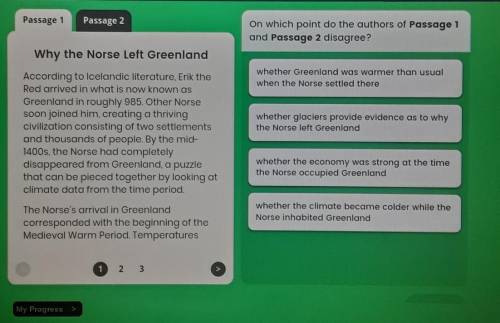
English, 30.09.2021 03:10 savyblue1724707
On which point do the authors of passage 1 and passage 2 disagree??


Answers: 3
Another question on English

English, 21.06.2019 22:00
When i was four years old, my dad and i a tree in our front yard. it was a tiny, fragile sapling. he promised me that it would grow tall and strong, but he said that i had to be patient. until i turned 18 years old, dad and i it every year on my birthday. choose the words that correctly fill in the blanks.
Answers: 1

English, 21.06.2019 23:30
Plz (i only understand "the song of wandering aengus." and i have no idea what the raven means so i can't answer this. me i will give brainlest and a 5-star rating) consider the speakers in "the raven" and the speaker in "the song of wandering aengus." write two paragraphs to compare and contrast the voice in these two poems. how does the poet give the speaker in each poem a distinctive voice? what effect does this voice have in each poem? use examples from each poem to as evidence for your answer
Answers: 2


English, 22.06.2019 10:00
Ineed . read this textbook passage. select the five (5) statements which are most logically supported by the given information. what would you do if you won ten million dollars in a lottery? your first reaction might be, “i’d spend the rest of my life on the beach (or skiing or traveling).” but in all likelihood you, like most other people who receive financial windfalls,would seek some kind of work eventually. a variety of motives keeps people working,even when they don’t need a paycheck to survive. if you’ve ever worked as a volunteer, you know that someone can be more satisfying than receiving pay. work also provides a sense of identity. one man aged 81 said, “i’ve been in the fabric business since i was a kid, and i still get a kick out of it." studies suggest that rats, pigeons, and children sometimes work to gain rewards,even if they can get the same rewards without working. one researcher wrote the following on the subject: rats will run down an alley tripping over hundreds of food pellets to obtain a single, identical pellet in the goal box, . . and pigeons will peck a key . . to get exactly the same food that is freely available in a nearby cup. given the choice of receiving marbles merely by waiting a certain amount of time for their delivery, children tend to prefer to press a lever . . to get the same marbles. 1. serving a purpose is satisfying. 2. it is not so lucky to win a large amount of money in a lottery. 3. endless “vacationing” eventually becomes dissatisfying. 4. the pay we receive is unimportant. 5. most people try to work as little as possible. 6. people, rats, and pigeons enjoy the challenges and interaction that work offers. 7. it generally feels better to achieve something than to be given something. 8. people who don’t retire continue to work only because they need the money. 9. most people who work as volunteers resent the fact that they are not paid for their work. 10. work can be its own reward.
Answers: 1
You know the right answer?
On which point do the authors of passage 1 and passage 2 disagree??
...
...
Questions

Mathematics, 16.10.2020 15:01

Mathematics, 16.10.2020 15:01

Mathematics, 16.10.2020 15:01


Mathematics, 16.10.2020 15:01


Mathematics, 16.10.2020 15:01

Mathematics, 16.10.2020 15:01




Mathematics, 16.10.2020 15:01

Mathematics, 16.10.2020 15:01




Mathematics, 16.10.2020 15:01

Mathematics, 16.10.2020 15:01





